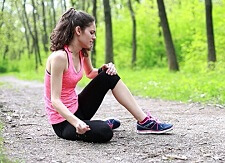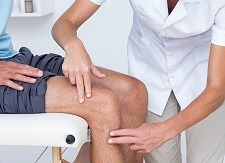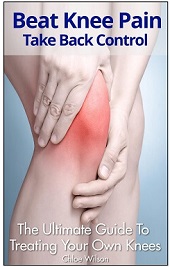- Home
- Knee Exercise Guide
- Advanced Exercises
Knee Rehab Exercises
Written By: Chloe Wilson, BSc(Hons) Physiotherapy
Reviewed by: KPE Medical Review Board
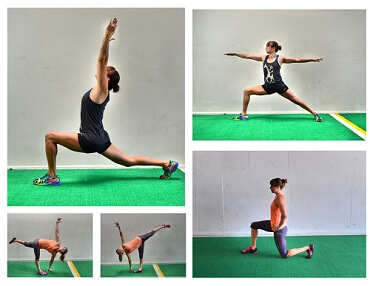
Knee rehab exercises aim to increase muscle strength, flexibility and control. This helps reduce knee pain, stiffness, weakness, instability and swelling caused by injuries, long-term knee problems and surgery.
Here you will find a general programme of advanced-level knee rehab exercises working on strength, flexibility and balance. They target all the important leg muscles, the quads, hamstrings, buttocks and calf muscles.
If you have not already tried the beginners or intermediate exercises, do start there first. Exercises should feel challenging but not aggravate your pain. Find out more in the Exercising at the Right Level section.
Advanced Knee Rehab Exercises
To get the most out of these advanced knee rehab exercises, visit the Top Tips on Exercising section before you start.
You should always see your doctor before you start any knee rehab to get an accurate diagnosis, but once you get the all clear, you’re ready to begin.
1. Squats With A Weight
Purpose: Squats are one of the best ways to improve knee strength and abolish pain. They target the hamstrings, quads and buttock muscles
Starting Position: Stand upright with feet hip width apart, toes pointing forwards.
Action: Slowly squat downwards as far as is comfortable without letting your knees go forwards over your toes. Then return to starting position
Repetitions: 10-30 repetitions
Top tips: Don’t let your knees drop inwards, keep your kneecap in-line with your second toe
Progression: Hold a weight e.g. a medicine ball and as you squat down reach forwards as shown in the video
2. Bridging: Stage 2
Purpose: Great knee rehab exercise to strengthen the hamstrings, quads and buttock muscles. If you haven't already done Bridging: stage 1, start there.
Starting Position: Lie on your back with both knees bent about 90° and your feet on the floor/bed. Knees should be slightly apart (tennis ball width)
Action: Clench your buttocks and lift your bottom off the bed as high as you can without arching your back. Then lift one leg up. Hold for 3-5 seconds and slowly lower
Repetitions: Repeat 10-25 times, 1-2x daily
Top Tips: 1. Keep your back straight – don’t let it arch as you lift up, it should be your bottom doing the work
2. Don’t hold your breath – keep breathing normally
3. Keep your knees tennis ball width apart – don’t let them drop out or lock them together
4. Don’t let your hips drop during the exercise – keep them up as high as you can
Progression: Use resistance bands to make the exercise harder - either loop a band around your lower thighs and gently push out against the band as you lift, or loop a band across your thighs and anchor it in each hand
3. Chair Squats
Purpose: Increase knee strength (quads, hamstrings, glutes)
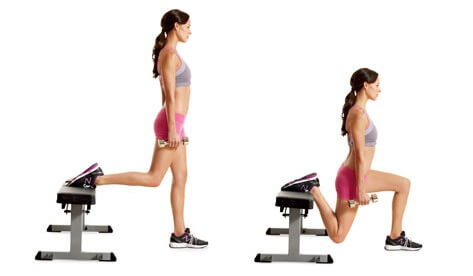
Starting Position: Stand on the leg to be worked and put other leg behind you on a chair/bench
Action: Slowly squat down as far as comfortable. The knee should not go beyond your toes (see dotted line). Return to starting position
Repetitions: 10-30 repetitions on each leg
Top Tips: 1. Keep your back straight throughout the exercise – don’t lean forwards
2. The movement should be slow and controlled for maximum benefit.
4. Lunge Backs
Purpose: Great knee rehab exercises to increase quads, hamstring and buttock strength. Also helps improve knee control
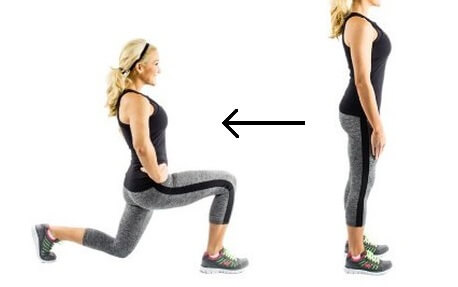
Starting Position: Standing
Action: Slowly step backwards and squat downwards taking your back knee towards the floor. Then slowly return to starting position
Repetitions: 10-30 repetitions on each leg
Progression: Start with your front foot up on a step - this allows you to squat down even further!
Top Tips: 1. The emphasis should be on a slow, controlled movement
2. Don’t let your front knee go forwards over your toes
5. Forward Lunges
Purpose: Great knee rehab exercises to increase knee strength and control
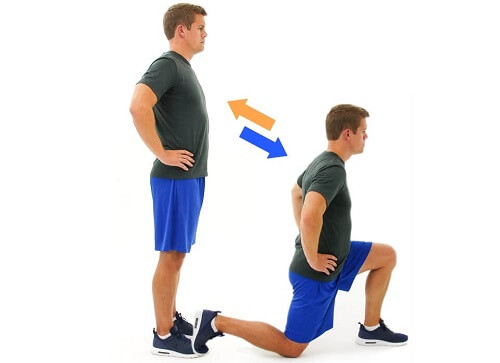
Starting Position: Standing upright, feet pointing forwards
Action: Step forward with one leg and drop your back knee, keeping most of your body weight on your front leg. Push off the front leg to return to standing position
Repetitions: 10-30x on each leg
Top Tips: 1. Keep your toes pointing forwards and your back straight
2. Don’t let your front knee go over your toes – if that is happening you need to step further forwards
Progression: Hold weights while doing the exercise
6. The Clam: Stage 2
Purpose: Strengthen the buttock muscles (glutes) to help support the knee and prevent excessive weight going through the inner side of the knee. Most people with knee pain have weak glutes. Make sure you can do The Clam: Stage 1 first
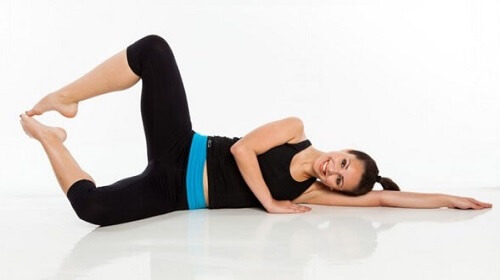
Starting position: Lie on your side with your hip and knees bent approx 90°, feet together. Lift your feet up about 30cms off the bed, knees still resting on the bed/floor
Action: Keeping your feet together, lift the top knee up as high as you can without rolling back at your hips. Hold for 3 seconds and slowly lower
Repetition: Repeat 10-25x on each side, 2x daily
Top Tips: Do not let your top hip roll backwards
Progression: Place a loop resistance band around your knees so you have to push up against the band to work harder
7. Single Leg Dead Lift
Purpose: Improve balance and control of knee - both important parts of knee rehab exercises
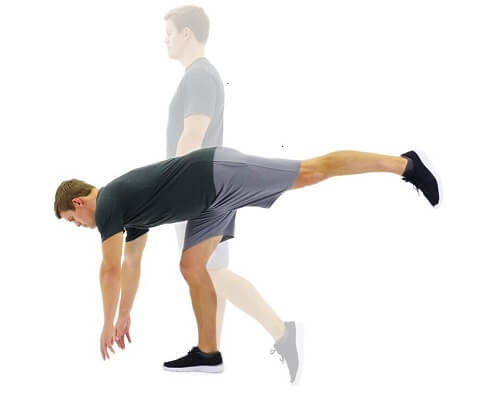
Starting Position: Stand on one leg
Action: slowly reach down to the floor lifting your other leg behind you, then slowly return to starting position
Repetitions: 10-30x on each leg
Progression: 1. Put items e.g. cones on the floor in a semicircle around you and reach for one cone at a time
2. Keep your knee slightly bent as you do balance knee rehab exercises
What Next?
Knee rehab exercises are one of the most important parts in recovering from pain. If these exercises seem too challenging or you are just starting out, try our beginners and intermediate knee rehab exercises first.
Another effective way to reduce many causes of knee pain is to improve the flexibility of knee muscles by stretching. Most people have tighter muscles than they should. To see if you have a problem check out some simple stretching tests or skip straight to stretching exercises.
It always helps to know what is causing your pain to ensure the knee rehab exercises are suitable for you. Visit the knee pain diagnosis section for help or find out more about the most common causes of knee pain.
You may also be interested in the following articles:
Page Last Updated: 12/12/23
Next Review Due: 12/12/25
